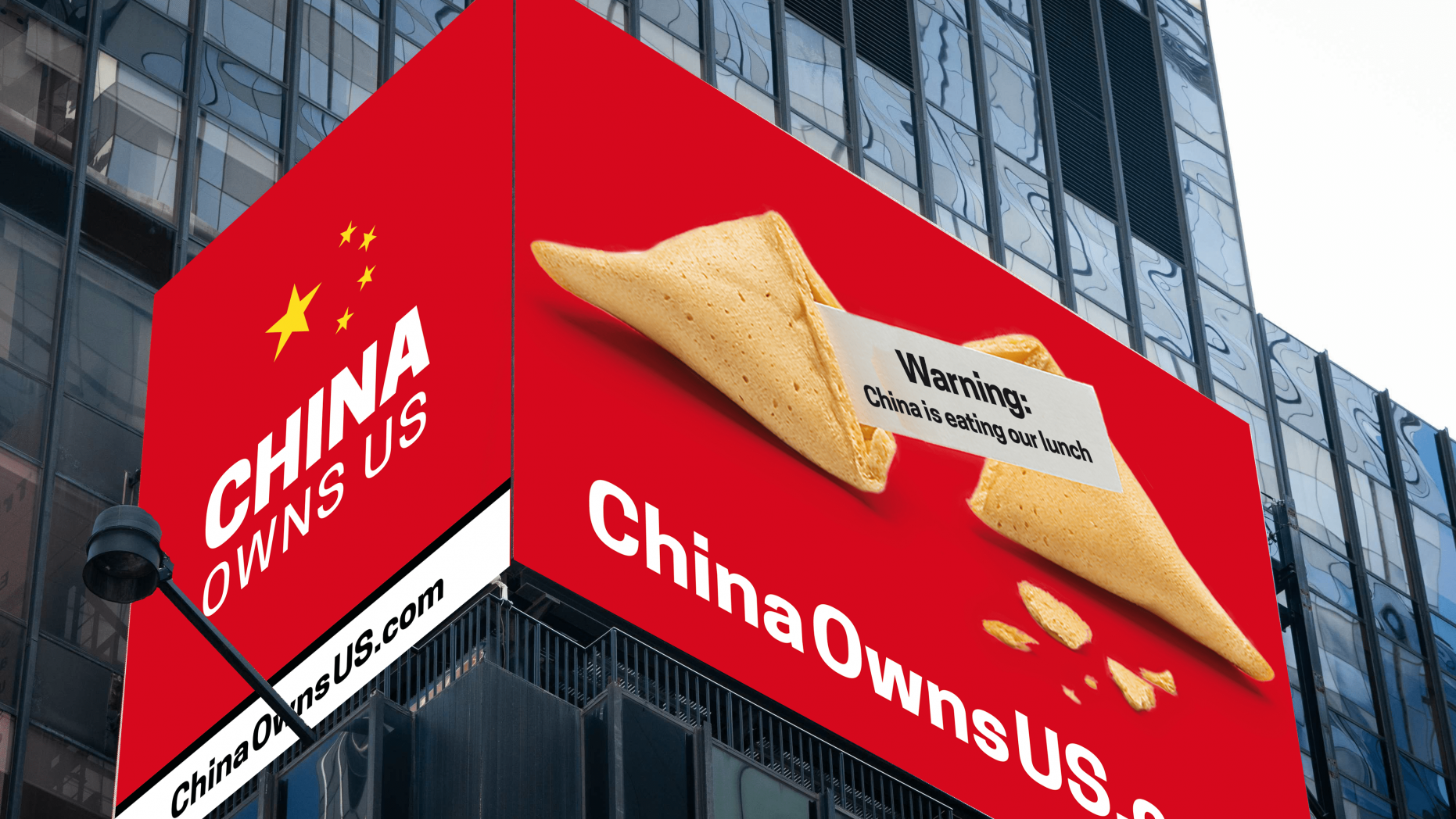China has slowly bought big in America, dominating the global supply chain in a range of industries.
UNITED STATES (American Security Institute) – The coronavirus pandemic may have shed light on China’s influence in the United States over the supply chain, including life-saving medicines, technology, and equipment.
The American Security Institute recently released a report from China Owns Us and launched a campaign featuring a billboard in Times Square, to draw further attention to the extensive array of sectors the Chinese government and its partners have invested into. But, how much of the nation China own?
Education
The Chinese government’s theft of intellectual property has been an open secret for decades. More recently, U.S. authorities have discovered China is funding American university researchers, who don’t always disclose those contributions.
Technology
Manufacturing of smartphones and other household items is heavily reliant on China, which controls most of the rare earth minerals that make those items work. Additionally, China seeks to build 5G networks in the United States and other Western countries, which could potentially feed personal information and sensitive data to the Chinese Communist Party. At least that is what the US government claims.
Medicine.
China produces 97 percent of U.S. antibiotics and about 80 percent of active pharmaceutical ingredients used in American drugs, giving the Chinese Communist Party absolute control of potentially life-saving medicine. For example, Chinese pharmaceutical companies supply 70 percent of the world’s acetaminophen, commonly used in Tylenol.
Food.
In 2017, the United States imported $4.6 billion in agricultural goods from China, which is also responsible for much of the global supply of soy and pea proteins found in nutritional supplements and synthetic meats. A Chinese firm has also purchased Smithfield, the world’s largest pork processor, and pork producer.
Media.
Chinese firms have bought AMC Entertainment, Legendary Entertainment, and other media companies. Control of 8,000-plus of American theater screens and other media platforms allows China to project “soft power” and block unflattering depictions of the Chinese government from being presented, both in terms of creative production and mass distribution.
Citing the nonpartisan economic think-tank Paulson Institute, the American Security Institute report underscores that “Chinese firms and investors own a controlling majority in nearly 2,400 U.S. companies.”
Among those:
AMC Entertainment (entertainment), Cirrus Wind Energy (energy), Complete Genomics (health care), First International Oil (energy), G.E. Appliances (technology), IBM—P.C. division (technology), Legendary Entertainment Group (entertainment), Motorola Mobility (technology), Nexteer Automotive (automotive), Riot Games (entertainment), Smithfield Foods (food), Teledyne Continental Motors and Mattituck Services (aerospace), Terex Corp. (machinery), Triple H Coal (mining), Zonare Medical Systems (health care).
“Under China’s Communist Party dictatorship, private companies are forced to bend to the government’s will,” the report states. “A recently passed law in China requires companies to share data with Chinese communist spy agencies if requested. [U]nder Xi Jinping, the Communist party has returned to being the ultimate authority in business,” writes The Guardian. Human Rights Watch has written, “China is an ‘existential threat’ to human rights.”
And while the U.S. grants China permission to buy its companies, China does not allow U.S. companies to operate the same way on their soil. The extent of Chinese investment in recent years has also raised red flags around U.S. national security, particularly in rare earth minerals.
These are especially vital not only for high-technology products such as smartphones and electric vehicles but for U.S. frontline weapons, including the F-35 fighter, which requires 920 pounds of rare earth minerals. “In 2017, the United States produced zero rare earth minerals. On the other hand, China accounted for more than 80 percent of the world’s supply,” the report stated.
The full extent of the Chinese investment as it stands in the U.S. today is far from transparent. Milos Maricic, an international affairs expert and World Economic Forum contributor, concurred that while China owns close to $150 billion in U.S. companies – not particularly huge compared to the U.S. economy – there is a lot about the available figure that the U.S. simply do not know.
“The number is very difficult to gauge correctly due to complicated ownership structures that the Chinese sometimes employ. It could be bigger,” Maricic inferred.
Some U.S. lawmakers are pushing back amid the coronavirus fallout, which ignited an initial panic over concerns of critical medical shortages and Beijing’s threats to withhold the needed goods.
In late May, the Senate unanimously passed the bipartisan Holding Foreign Companies Accountable Act to force foreign companies – with China at the likely forefront – to adhere to U.S. securities law compel some to be removed from American stock exchanges.
The bill, which is yet to move through the House, would necessitate that an issuer make this certification, if the Public Company Accounting Oversight Board is unable to audit specified reports because the issuer has retained a foreign public accounting firm not subject to inspection by the board.
More than 200 foreign firms – mostly Chinese with a combined market capitalization of almost $2 trillion – are said to NOT be meeting this standard, so their stocks are traded, but U.S. investors have limited insight into what is going on internally with the companies.



